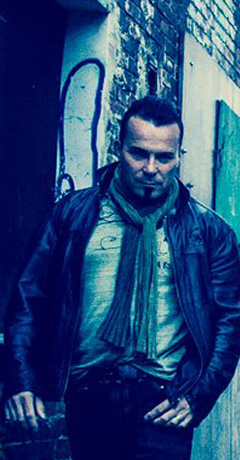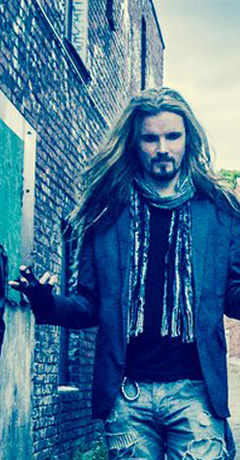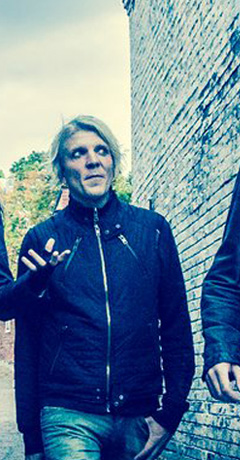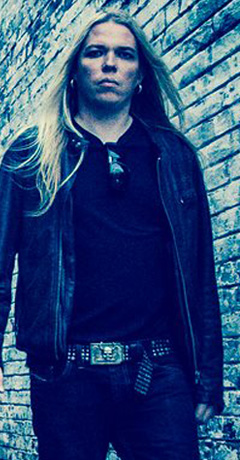Apocalyptica biography
Apocalyptica biography
Respected sources, the oldest surviving cello can be dated back to 1572. It was fashioned by the Italian Andrea Amati, a Cremonese craftsman who could never have guessed that distant cousins of his cherished violoncello would one day be fitted with pre-amps & pick-ups then remorselessly bowed to the brink of sawdust.
Simply, there is no other band like Finlands Apocalyptica a collective of classically-tutored cellists (with attitude!) who have successfully brought together the seemingly disparate worlds of classical music & hard rock without diluting either one. Since 1993, when these Sibelius Academy graduates first raised their black-haired bows in rocknroll anger, they have released two critically-lauded albums (of covers & originals), with a third, the Kai Hiili Hiilesmaa-produced "Cult", due out in November through Spitfire Records; during this time, the Helsinki-based heavy cellists have put their suitably dramatic monicker to over half-a-million album sales and topped the three-figure mark for concerts in more than 20 different countries, picking up accolades (such as the 1997 Export Project Of The Year Award) along the way. Not bad for a band who started out playing Metallica songs for fun.
The turning point for Apocalyptica came in December 1995 when they were asked to perform at the heavy metal club Teatro in Helsinki; it was here, whilst giving the full four-cello treatment to Metalli-classics like Master Of Puppets and Creeping Death, that the burgeoning A-Team were spotted by local independent Zen Garden Records, who suggested they make an album showcasing the modern metal classics nearest (and dearest) to their collective heartbeat. The rest is heavy cello history Released in Spring 1996, the debut Apocalyptica album "Plays Metallica By Four Cellos" has notched up worldwide sales in excess of 350,000, gaining rich & ready approval from both sets of supporters (strictly classical & hardline rock); what's more, by focussing on the unadorned sound of the cello, this dare-devil disc of Metalli-covers not only gave a dramatic twist to high-profile outings such as "Enter Sandman" & "Sad But True", but also showed what well-wrought compositions they really are.
As a result of the recognition afforded to "Apocalyptica plays Metallica by 4 cellos", two tracks from which were featured in US movie "Your Friends And Neighbors" (1998), the band were able to take their maple wood & metal show to a host of European territories, including Germany, Switzerland, Estonia, Turkey, Portugal, Belgium, Austria, Holland, the UK, Scandinavia & Finland, headlining in some places playing major festivals in others. No doubt about it - word on this uniquely rockin outfit was seriously starting to spread; even before they crossed the threshold of Millbrook Studio, Helsinki, in January 1998 to set to work on the Four Cellos follow-up, there was already anticipation as to what kind of record this might be.
April 1998 in Finland and internationally thereafter, the Inquisition Symphony album once again saw the band shifting into total tour mode, starting with dates in their native land and then striking out to other countries, some of which (Italy, Greece, Luxembourg, Mexico, Poland, Czechoslovakia, Hungary, Lithuania, Bulgaria, etc.) were figuring on the itinerary for the very first time Says Eicca: "The four dates in Mexico were quite overwhelming, and the same holds true for the shows in Eastern Europe, which is currently one of our best live areas; we've been selling out halls of 2,000-2,500 in Bulgaria, and last time in Lithuania we played to around 3,500."
Their album "Reflections" (release date: February 10, 2003) catapulted Apocalyptica, the heavy cello thunder from the darkest depths of Finland, straight out of their image of being the most unique cover-band in the world. Where once Metallica, Slayer, and Sepultura ruled the world of the classically-trained cellists Eicca Toppinen, Paavo Lötjönen, and Perttu Kivilakso, it is now their very own musical self.
"Apocalyptica has always been very creative project definitely rooted in the here and now", is how Perttu Kivilakso explains the philosophy behind the album. "Once, creativity for us meant imitating the typical Heavy Metal guitar sound on our instruments. Now it means exploring our own musical vision. We simply wanted to employ our instruments on a much wider scale and also got interested in developing new techniques for the cello."
Hundreds and hundreds of lonely hours were spent in the studio searching for their own sound. The result, plain and simple: "We created a new musical style, cello-rock."
On their predecessor "Cult", Apocalyptica had first dissolved musical boundaries. Back home in Finland, the album was consequently reviewed by journalists from the classical terrain - "and what's wrong with that?" is all Paavo Lötjönen has for a comment. "We are professionals, we are very serious about what we are doing and we approach our music with sincerity - so where's the problem?"
Well, there is none. Apocalyptica is simply in the front line of an indigeneous Finnish music culture where artists strive to mix and match the most varied of musical styles.
Apocalyptica's musical influences range from the Russian composer Dmitri Shostakovich to Heavy Metal and opera and are so multifarious that bridging them takes more than a simple balancing act. The mastery of such monumental sounds requires ability and exceptional flexibility.
Three further studio outings and a couple of line-up changes down the line, and Apocalyptica stand (or, more accurately, sit!) as a major force in the world of popular music; a trio - now enhanced by drummer Mikko Siren - who have sold almost two million albums worldwide, played in well over 20 different countries (Mexico, Russia & Japan included), recorded with guest vocalists such as German "punk godmother" Nina Hagen, picked up high-profile awards for video & export achievements, remixed/reworked tracks for other name artists (Bush - Letting The Cables Sleep), Special Guested with Metallica (twice!) and still found time to record a new album, set for release through Universal Music Germany in late January/early February 2005.
Self-titled, self-produced and featuring 11 new tracks of all original material, "Apocalyptica" The Album sees these Cello-Rockers From Hel(sinki) taking their exploits of the past 10 years to a whole new level of success. On previous recordings, they had either kept the songs as instrumental pieces, pure an' simple, or else worked in the vocals down the line, with Sandra Nasic (Guano Apes), Linda Sundblad (Lambretta) & the aforementioned Nina H. all stepping up to the mic. at various points; when it came time to compose the latest material, however, Eicca was of the opinion that vocals should be involved - at least in part - from day one. He wanted the fifth album to be as complete a body of work as possible, a new chapter in the Encyclopaedia Apocalyptica; this is why first single "Bittersweet" (supported by an Antti Jokinen-directed promo) sees two of the rock scene's fastest rising frontmen, Ville Valo from H.I.M & Lauri Ylonen from The Rasmus, sons of Finland both, going head to head and heart to heart while the band hang like bats from the ceiling!
At the heart of any Apocalyptica release is the pure sound of the cello, and by generally slowing the pace a touch, by being prepared to tug on the reins when needed, the band have been able to achieve a studio sound high on authenticity and colour; of course, it helped quite a bit that the studio in question (Susi) had actually been constructed for this very purpose by Eicca himself - a smart & sensible way of gaining the control mentioned above.
But it was 2007's "Worlds Collide" that turned Apocalyptica into an international phenomenon. As with its predecessors, the disc featured numerous guest stars: Lombardo returned for "Last Hope", Slipknot's Corey Taylor appeared on "I'm Not Jesus", Lacuna Coil's Cristina Scabbia sang on "S.O.S. (Anything But Love)", Rammstein vocalist Till Lindemann performed on a cover of David Bowie and Brian Eno's "Helden" and Three Days Grace singer Adam Gontier sang his heart out on "I Don't Care".
Since they formed in 1993, their music has been gripping, dynamic and full of melody. But with their seventh album, 7th Symphony the band has composed an album that not just symphonic, it's practically a symphony.
At the same time, 7th Symphony contains songs that rock harder than anything they've done since 2001 when they released the epic, transfixing album Cult, their first album to contain mostly originals. In the same way that Cult caused fans to view Apocalyptica from a different perspective, 7th Symphony is the next forward step in the group's creative evolution. Most of the songs on the disc were produced by Joe Barresi (Queens of the Stone Age, Tool) and two of the four vocal numbers were produced by Howard Benson (My Chemical Romance, Papa Roach).
Working with Barresi as the main producer, was rewarding for Apocalyptica for a couple reasons. First, after years of flying around the world to record, they were able to work home in Helsinki. More importantly, they appreciated Barresi's ear for detail and creative ideas. "We used much more effects than we usually do and got a different kind of sound experience than ever before, but still I think the album is very organic," Toppinen says. "The drums area more natural and there's not so much sampling or editing. When we were tracking, we just found great sounds and recorded them right there. We didn't fix them in the mix with punch ins like people do nowadays."



